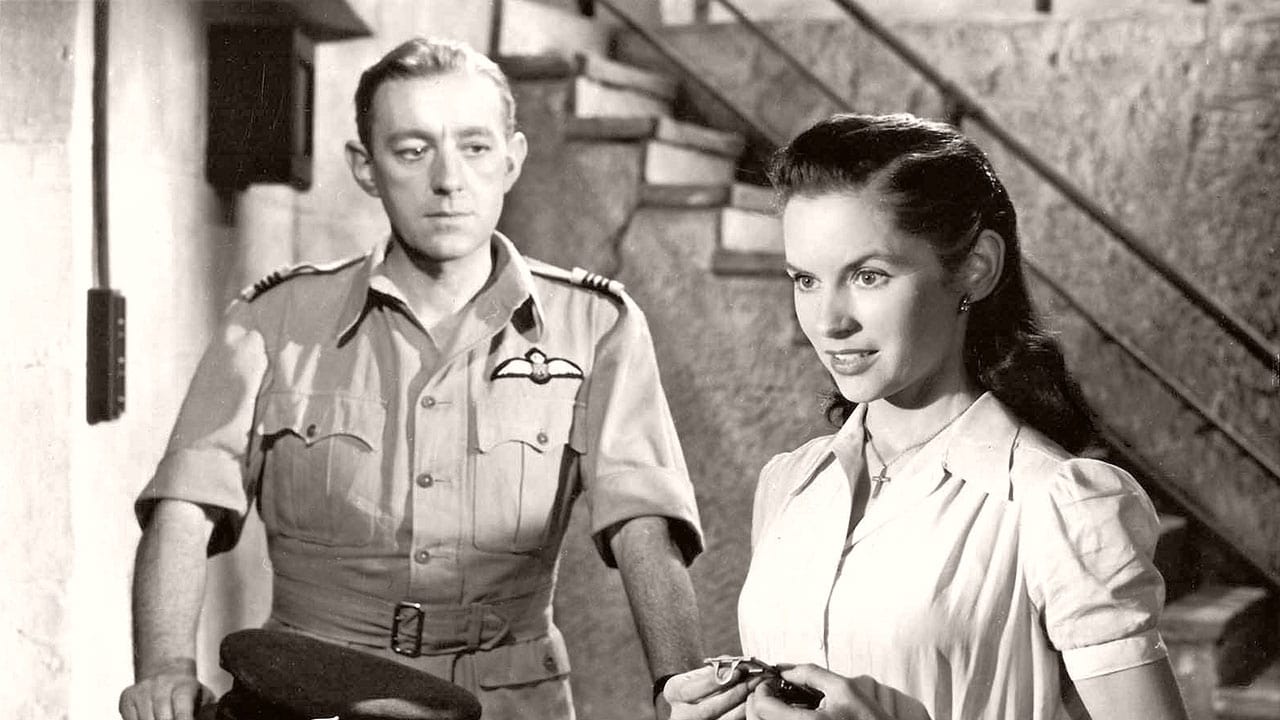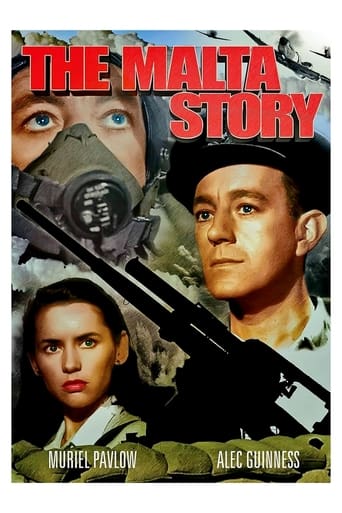

The Siege of Malta was one of the most heroic episodes of the Second World War. The fall of France and the entry of Italy into the war had turned much of the Mediterranean into an Axis lake, and yet the British forces and the Maltese people were able to defend this small island, less than sixty miles from the coast of Sicily, against repeated German and Italian air attacks. This successful defence, however, was mounted at a heavy cost in lives among the defending forces, among the civilian population and among the naval forces struggling to bring desperately needed supplies to the beleaguered island. The importance of Malta to the Allied war effort was that it could be used as a base from which the British could mount attacks on convoys bringing supplies to the Axis forces in North Africa.This epic story, therefore, was a natural subject for one of those "how-we-won-the-war" films which were such a mainstay of the British cinema during the fifties, and this is the result. It does not deal with the whole of Malta's role in the war; there is, for example, no mention of the three famous Gloster Gladiator biplanes, "Faith, Hope and Charity" which defended the island in 1940. It deals with the climax of the siege in the summer and winter of 1942, the period of most intense aerial bombardment, and combines a semi-documentary approach with a fictional love story between an RAF pilot and a Maltese girl.The Wikipedia entry for this film describes Alec Guinness as "cast against type". Now it is true that Guinness made surprisingly few war films for a British actor of his generation compared to contemporaries like John Mills or Kenneth More, but he was such a versatile actor that he didn't really have a "type"- in one film alone, "Kind Hearts and Coronets", he had played several different characters. An RAF pilot was just one more to add to his gallery of roles.His character here, Flight Lieutenant Peter Ross, is an archaeologist in civilian life who has qualified as a pilot in order to photograph archaeological sites from the air. Because of this, he becomes an RAF photo reconnaissance pilot and is stranded in Malta en route to a posting in Egypt. The RAF in Malta are able to put his experience to good use and he plays a vital role in combating enemy attacks. He manages, however, to find enough spare time not only to explore the island's archaeological sites but also to romance a local girl, Maria.A subplot deals with Maria's brother Giuseppe, who is arrested as an Italian spy. This subplot is perhaps the most interesting aspect of the film, as it contains a relatively sympathetic portrayal of a Fascist sympathiser. Even though he knows that he faces execution as a traitor, Giuseppe does not attempt to deny that he is working for Italian intelligence or that he was attempting to obtain information which, had he succeeded, would have been of great assistance to the Axis forces. He is, however, depicted not as an evil character (as Axis sympathisers generally were in British movies) but as an honourable if misguided one. Giuseppe was partly based upon a real-life individual, Carmelo Borg Pisani, but there is a significant difference. Giuseppe is portrayed as being motivated by Maltese nationalism, whereas Pisani was not a nationalist but an advocate of the annexation of Malta by Fascist Italy.The original script had a happy ending, with Peter surviving and marrying Maria. The producer J. Arthur Rank, however, was not satisfied and brought in Nigel Balchin to rewrite the script. In the film as actually made Peter dies heroically while on a mission to locate an Italian convoy taking vital supplies to Libya. Some have queried whether the style of acting exemplified here is in keeping with the overall tragic tone, but I have no problem with it. Since the sixties it has been fashionable to mock the so-called "stiff upper lip", but in wartime an attitude of "Keep Calm and Carry On" (to quote from that poster which has recently become such a cultural meme) was absolutely indispensable; without it British resolve would have crumbled. In war films like this one, therefore, the relatively restrained style of acting favoured by Guinness and his co-stars seems quite appropriate."Malta Story" is perhaps not the greatest of the many British war films from this period, and has certainly never achieved the popularity of something like "The Dambusters". It is, however, a well-made example of the genre with some well-realised (by the standards of the period) recreations of aerial combat, and helps to keep alive a story which, though proudly remembered in Malta itself, is often overlooked in Britain. 7/10
... View MoreTo some it may be a dull black and white old style war yarn, but we need to remember that people waited outside the local cinema to enjoy movies like this, and believe me they were entertained.It's a well told story about a little clump of land in the middle of the sea and the people on it that probably prevented Rommels Panzer Army from running amok throughout North Africa.So watch it in all it CGI(less), special effects(less) glory and enjoy it for what it is.Hell, you might even want to watch some more (The desert rats, Ice cool in Alex, The desert fox, the Dunkirk story, god I could go on for ages).
... View MoreHaving just read "Tobruk" by Chester Wilmot, a journalist who spent time in the Tobruk siege and reported diligently about it, this piece informed me of another similar siege that I was unaware of. The use of archive footage is fascinating, mixed in with a simple story of love that feels lighter and without the moralising heaviness and embarrassing "post modern" pretensions of many modern day films ... especially war films. Very much a product of it's time ... they really don't make them like this anymore. Some of it feels like a War time moral raising film. I even thought it was made in the war until I found out the 1953 date. But memories were still strong in those days of course, so there is a flavour of a story burning to be told to the world before times move on.
... View MoreIt is a gripping story that is told about the efforts made to make use of that stationary aircraft carrier in the middle of the Mediterranean. It is also poignant that Alec Guinness should play the part of a reconnaissance pilot because it is just this ruse that the British used to pretend that they hadn't broken the Italian and German ciphers thus enabling them to sink all the Gerry troop ships and always be just in time everywhere. A lame performance by the cast is diverted by the backdrop of a desperate situation on a tiny island that has been invaded by every great power since anyone can remember. If Ultra hadn't done it stuff these people would have been run over even though the Axis forces would have lost the war in the long run.
... View More